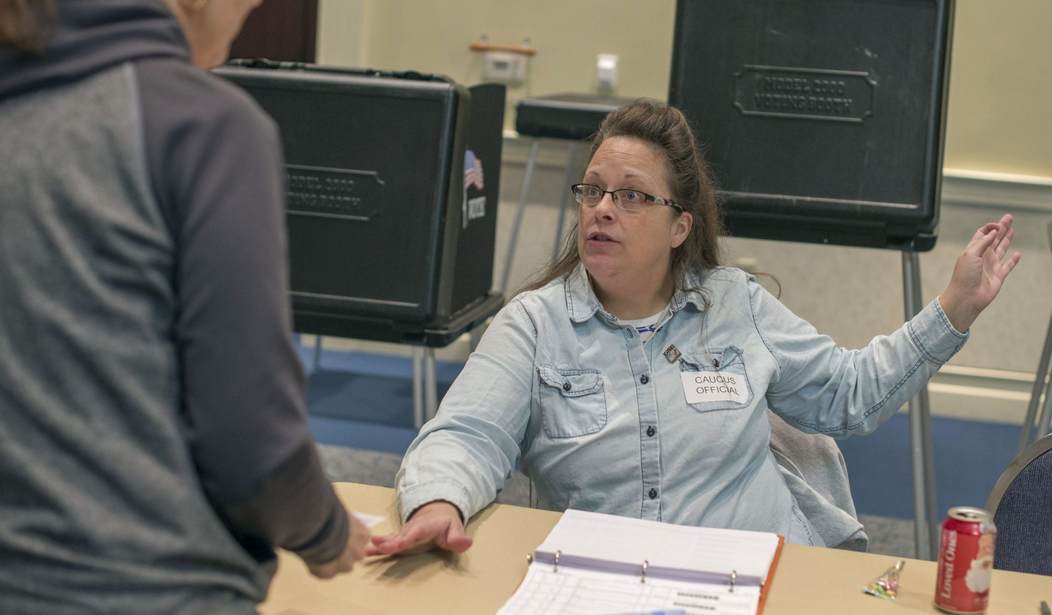The cost of fighting for same-sex marriage equality may not fall on the shoulders of the gay couples who went to court to sue for their right to get marriage licenses in Rowan County, Ky.
Instead, the woman who fought for what she saw as her religious freedom to refuse to sign those licenses might have to fork over close to $233,000 to pay the gay couples’ legal bills.
It all depends on whether Kim Davis or the gay couples are declared the “prevailing party” or the winner of the court battle.
Davis paid the price for what some would call her religious conscience and others would describe as discrimination. She was jailed for contempt of court earlier this year. But a federal judge dismissed the gay couples’ lawsuit against Davis along with two other cases after the Kentucky Legislature approved a bill that removed county clerks’ names from all marriage licenses.
Still, it’s pretty much a rule of law that successful plaintiffs in civil-rights lawsuits could be entitled to getting their legal bills covered by the defendants who lost.
The question here is, who lost?
Dan Canon, the attorney who represented all four gay couples who sued, said even though the lawsuits were dismissed and Davis was released from jail his clients should be declared the winners.
University of Louisville law professor Sam Marcosson told the Courier-Journal the judge will probably rule in the plaintiffs’ favor, and Davis will have to pay.
However, Mat Staver, the founder and chairman of Liberty Counsel, the organization that represented Davis, said his group filed an opposition response to the plaintiffs’ motion.
Staver said the plaintiffs fell far short of being judged the winner because the federal district court dismissed the case, closed the files and ordered all the pending cases to be removed from the docket.
“Kim Davis won the case, and the case is closed,” Staver said. “This is a ‘Hail Mary’ attempt by the ACLU because the cases were already dismissed and closed. I do not think they have a prayer.”
Bill Sharp, with the American Civil Liberties Union of Kentucky, disagreed with Staver’s argument.
“Courts recognize that when successful civil rights plaintiffs obtain a direct benefit from a court-ordered victory, such as in this case, they can be entitled to their legal expenses to deter future civil rights violations by government officials,” Sharp told the Lexington Herald-Leader.
But Sharp also said the court will probably order either Rowan County or the state government to pay the bills, not Davis.
Rowan County officials have already filed court documents making the case that the responsibility should not be theirs but the state’s because Davis was acting on behalf of the state of Kentucky when she refused to sign the marriage licenses.
“County clerks are not employees of the county, but instead are the holders of elective office pursuant to the Kentucky Constitution,” Jeffrey C. Mando, an attorney for Rowan County, wrote.
Whichever way the decision goes, one thing is sure, according to M. Christian Green, a senior fellow at Emory University’s Center for the Study of Law and Religion: Kim Davis will not be the last person to fight a legal battle of conscience in court.
Green told the Christian Science Monitor “the whole area of individual conscience claims” has grown in recent years. That includes people like Davis and corporations like Hobby Lobby that fought an Obamacare provision that required the company to cover contraceptives in their health insurance plans.
However, Green also said Kim Davis, by taking a stand while employed in the public sector, raised the plateau of individual conscience claims to a new level and created a new question.
“How are we going to adjudicate everyone’s conscience,” Green said, “if they’re public employees?”
Civil libertarians are afraid Green is correct: there will be more Kim Davis-like individualists who refuse to ride the tide of same-sex equality. Gay rights activists point to the introduction of the First Amendment Defense Act in June 2015 as evidence.
The legislation sponsored in the Senate by Republican Sen. Mike Lee (Utah) and in the House by Rep. Raul Labrador (R-Idaho) would protect those, like Davis, who oppose same-sex marriage based on their religious beliefs, from action by the federal government.
Its key clause reads: “Notwithstanding any other provision of law, the Federal Government shall not take any discriminatory action against a person, wholly or partially on the basis that such person believes or acts in accordance with a religious belief or moral conviction that marriage is or should be recognized as the union of one man and one woman, or that sexual relations are properly reserved to such a marriage.”
LGBT rights advocate Matt Baume said the First Amendment Defense Act is nothing but a smokescreen for more discrimination and should be called the “Kim Davis Cloning Act.”
But Labrador and Lee don’t see the avalanche of Kim Davis copycats that Baume warned of as being a bad thing.
“Religious freedom is at the heart of what it means to be an American,” Labrador said. “No American should ever doubt these protections enshrined in the First Amendment.”









Join the conversation as a VIP Member